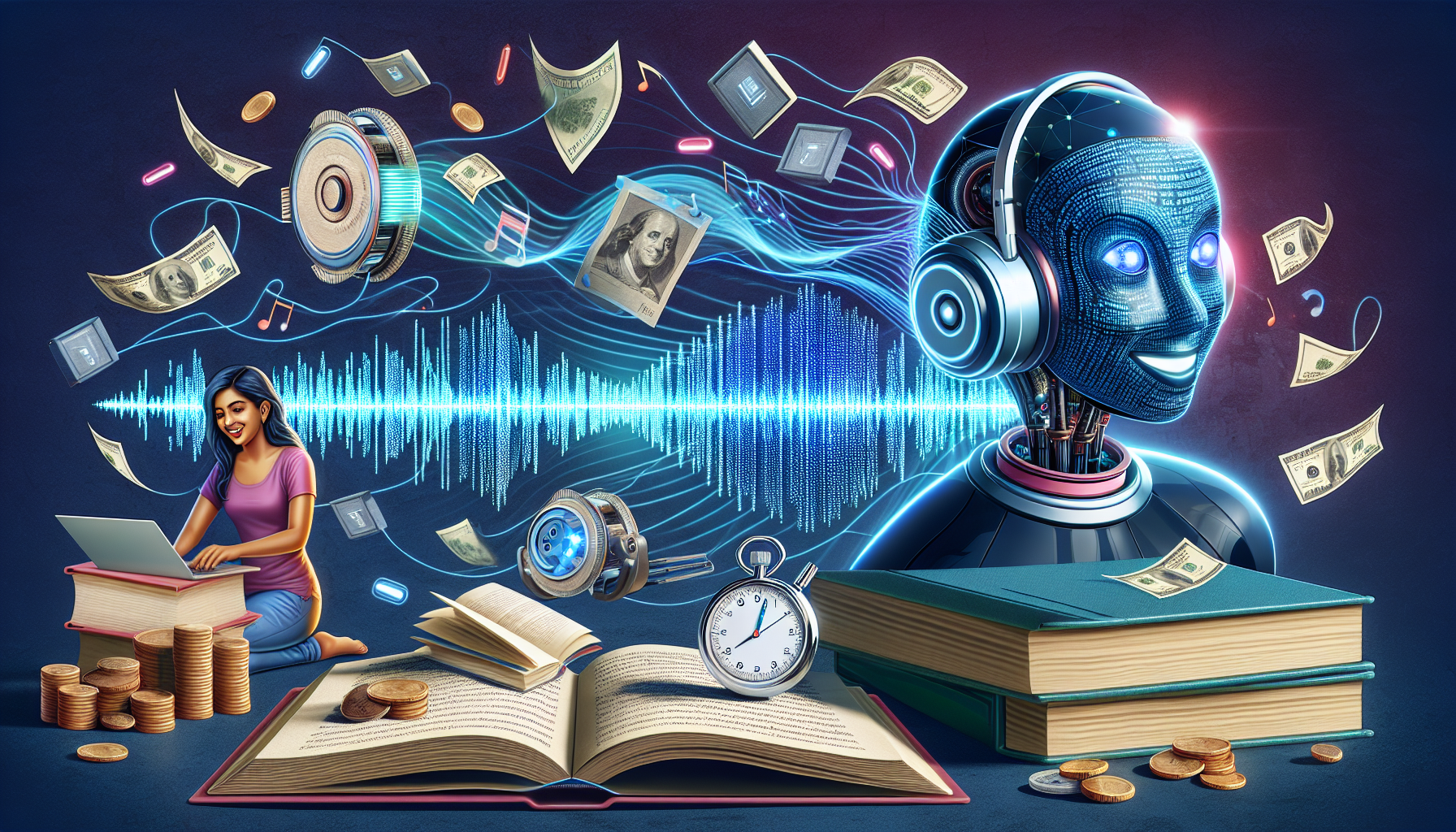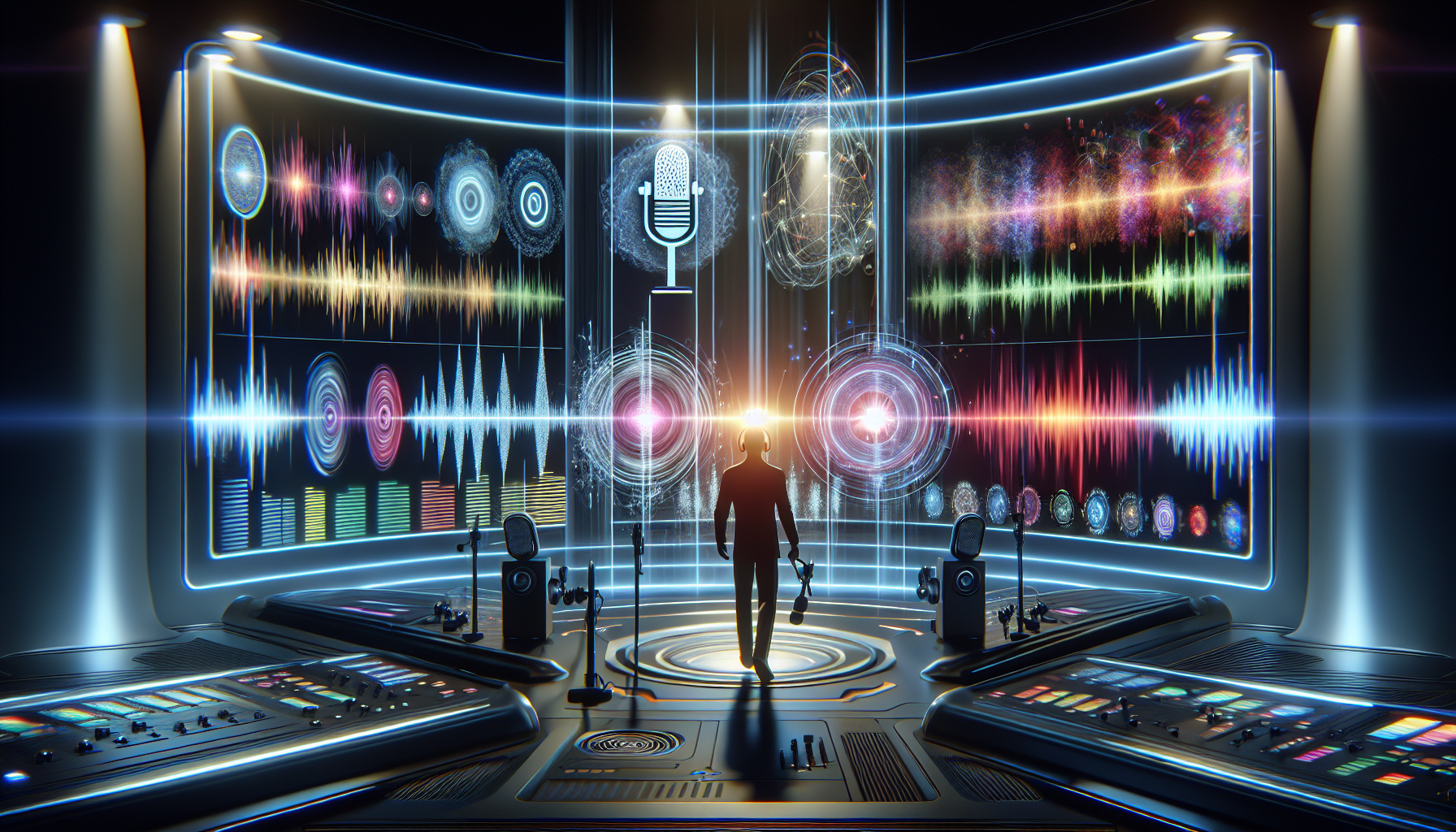Table of Contents
Looking to narrate your own books with AI voice tools? “Narrate Your Own Books with AI Voice Tools: A Guide for Writers” is the perfect resource for writers who want to transform their written works into engaging audiobooks without the cost of hiring professional voice actors. In this article, we’ll explore how AI voice technology works, the benefits for writers, and step-by-step instructions to create, customize, and publish your own AI-narrated audiobooks.
Key Takeaways
- AI voice technology can produce near-human audiobook narrations, making it cost-effective and efficient for authors to create audiobooks without traditional voice actors.
- Real-time voice cloning allows for personalized, dynamic narration, creating human-like voices that can replicate specific voices or characters for a more engaging listening experience.
- Using AI voice generators offers writers flexibility, fast production, and the ability to reach global audiences with multiple language options, all while maintaining high-quality audio output.
Understanding AI Voice Technology

AI voice technology has come a long way from its early days. Today, it uses text-to-speech (TTS) technology to transform written text into audio that sounds almost human. These natural sounding AI voices can capture the nuances and emotional cues of human speech, making them perfect for:
- Audiobook narration
- Podcasting
- Voiceovers for videos
- Virtual assistants
- Accessibility tools for visually impaired individuals
The evolution of TTS means authors can now produce audiobooks efficiently and cost-effectively, without the need for professional voice actors.
One exciting aspect of AI voice technology is voice cloning. This allows the creation of digital replicas of specific human voices, adding a personal touch to audiobook narration. Imagine having an AI that can mimic your own voice or that of a character in your book – it’s a game-changer for personalized storytelling. These generative voice tools can express emotions and intonations, making the narration dynamic and engaging.
AI opens up a world of endless possibilities. Its capacity to generate high-quality audiobooks in multiple languages and dialects allows you to reach a global audience. The advanced AI voices not only produce functional content but also deeply immersive experiences. As we explore further, you’ll discover the true power of AI for your audiobook projects.
Real-Time Voice Cloning

Modern AI technology marvels us with real-time voice cloning. Instantly usable digital replicas of a person’s voice can be created, adding a personalized touch to your audiobook. This technology allows for flawless and dynamic narration, which can be particularly beneficial for live readings or interactive storytelling sessions. Imagine hosting a live event where your AI-generated voice can narrate different characters in real-time, enhancing the listener’s experience.
Voice cloning is not just about replicating any voice; it’s about creating human like voices that are virtually indistinguishable from the original. This opens up a world of possibilities for writers. You can have multiple unique voices for different characters, making your audiobook more engaging and lifelike. The most advanced AI voices can modulate tones and convey emotions effectively, ensuring that your narration resonates with your audience.
Step 1: Data Collection
Collect high-quality audio recordings of the target voice.
Step 2: Transcription
Transcribe the audio recordings into text.
Step 3: Training the Model
Train the AI model using the transcriptions and audio data.
Step 4: Synthesis
Generate new speech that mimics the target voice.
Step 5: Customization
Fine-tune the speech for pitch, speed, and emotional tone.
Step 6: Validation
Compare and validate the cloned voice with the original.
Benefits of Using AI Voice Generators for Writers

Employing AI voice generators brings a lot of benefits for writers, with cost-effectiveness being a primary advantage. Traditional audiobook production can be expensive, requiring professional voice actors and extensive studio time. AI voice generators, however, provide a more affordable alternative without compromising on quality. Moreover, AI-powered audiobook creation is significantly faster, allowing you to produce content rapidly and meet tight deadlines.
Another major benefit of AI voice tools is the flexibility and scalability they offer. Here are some advantages:
- AI voices are available 24/7, eliminating the need for scheduling conflicts and extensive recording sessions.
- You can produce large volumes of content efficiently.
- You can cater to a global audience with various language options.
- The natural sounding AI voices enhance the listening experience, making your audiobooks more appealing to a wider audience.
Creating Natural Sounding Speech
Several techniques are involved in creating natural sounding speech with AI, with realistic intonation being a key aspect. which ensures that the AI-generated speech doesn’t sound robotic. By varying the pitch and tone, you can add emphasis and make the narration more engaging. Using contractions in your text, such as changing ‘do not’ to ‘don’t,’ can further enhance the conversational quality of the AI voice.
Another technique is to adjust the speed of the voice output to match the desired pace of the narration. This customization can make the speech more natural and easier to follow. Additionally, incorporating international voices with English text can add a realistic accent, making the narration more authentic. By fine-tuning these elements, you can create voiceovers that captivate and engage your audience effectively.
Customizing Your AI Generated Voices
The ability to customize AI-generated voices enables you to tailor the narration according to your specific needs. AI voices provide flexibility by letting you choose characteristics such as:
- Gender
- Age
- Language
- Accent
This means you can create voices that perfectly match the characters in your book, enhancing the storytelling experience. Adjusting the pace, tone, and emphasis can add depth and make the narration more engaging.
Pronunciation, pitch, volume, and pace controls are essential settings that help tune the AI voice to specific requirements. For instance, you can emphasize particular words to convey emotions or highlight important points in the narration. Custom voice creation also allows you to develop a unique voice for your brand or characters, adding a personal touch to your audiobooks. With these tools, you can create a consistent and high-quality audio experience for your listeners.
Choosing the Best AI Voice Generator

The selection of the best AI voice generator is instrumental in creating a successful audiobook. The best AI voice generators offer realistic AI voices with:
- Realistic speech with natural changes in tone and adequate pauses, making the narration sound more human-like
- A variety of voices to choose from, allowing you to find one that matches the mood and tone of your book
- High-quality audio output for an engaging listening experience
Choosing the right AI voice generator can greatly enhance the quality of your voice generation for audiobooks.
Another key factor to consider is the variety of voices and languages available in the voice library. This flexibility allows you to cater to a global audience and adapt your audiobook for different markets. High-quality audio output is also essential, so look for tools that offer the highest export audio quality possible for use in various projects.
Lalals: Your All-In-One AI Voice Tool
Offering a wide range of features for various media projects, Lalals.com is a versatile AI voice tool. With Lalals, you can:
- Transform your vocals or text into any voice of your choice, including those of celebrities
- Provide the best 44.1 kHz WAV audio quality, ensuring high-quality voiceovers for your projects
- Use it for dubbing movies and TV shows into other languages while maintaining the original tone of voice
- Create custom AI voices by providing at least 10 minutes of clean voice recordings
- Use the cloned voice for a variety of purposes, such as singing, rapping, speaking, and even as a voice changer
- Create songs, podcasts, and other audio content with studio-quality vocals
- Produce radio-ready tracks that are professionally mixed with one click!
Lalals’ AI technology makes it a powerful tool for music creation and more.
Furthermore, Lalals.com offers the following features:
- Commercial use of transformed vocals, allowing users to release their work on platforms like Spotify, YouTube, and TikTok
- Continuous improvement of the AI algorithm to provide more real sounding voices, reduced artifacts, and enhanced processing speed
- Exclusive access to your AI model, with the option to make it public if desired
This flexibility and range of features make Lalals.com an excellent choice for any media project.
Recording and Editing Your Audiobook
Several crucial steps are involved in recording and editing your audiobook with an AI voice generator to ensure a polished final product:
📖 Step 1: Record Each Chapter Individually
Start by recording each chapter individually to avoid text overlaps and ensure all content is accurate.
⏸️ Step 2: Add Custom Pauses
Adding custom pauses where needed can make the AI voiceover sound more natural and human-like.
🎛️ Step 3: Edit the Narration
After recording, it’s important to edit the narration by manually adjusting the pitch and tempo to match the characters’ dialogue and ensure correct pronunciation of unique words and terms.
💾 Step 4: Export in Lossless Format
Once the editing is complete, export the audiobook in a lossless format like WAV to preserve the highest audio quality.
These steps will ensure your AI-narrated audiobook sounds professional and engaging.
Integrating Background Music and Sound Effects
The immersive experience of your audiobook can be significantly enhanced by incorporating background music and sound effects. Sound effects can transform the listening experience, making it more engaging and memorable. Choose sound effects that underline specific moments in the story to enhance the overall feeling of the novel. For instance, in detective audiobooks, you can use sound effects like:
- Gunfire
- Sirens
- Footsteps
- Door creaking
- Phone ringing
These sound effects can recreate a noir atmosphere and add to the tension-filled moments in the story.
Background music can guide the interpretation of emotions in the story, providing a unique atmosphere to the narration. For example, in children’s audiobooks, playful sound effects can stimulate young listeners’ imaginations and enhance the storytelling experience. By carefully selecting and integrating these audio elements, you can create a ‘cinema in words’ that deeply engages your audience.
Publishing Your AI Narrated Audiobook
Choosing the right platforms to reach your audience is an integral part of publishing your AI-narrated audiobook. Google Play Books allows authors to convert their ebooks into audiobooks using over 50 narrator options. To publish on Google Play Books, you need to provide an EPUB ebook file in one of the supported languages. Additionally, Google Play Books partners with Findaway Voices by Spotify to distribute audiobooks to multiple platforms, including Spotify and Apple Books.
YouTube is another excellent platform for publishing your audiobook, potentially reaching a vast audience. Authors can upload their audiobooks as videos, providing another avenue for distribution. Moreover, when publishing on Google Play, you can download the AI-narrated audiobook files and sell them on other platforms. These options provide flexibility and a broad reach for your AI-narrated audiobooks.
Common Challenges and Solutions
Employing AI voice technology for audiobook narration presents its own set of challenges. One major challenge is that AI-narrated audiobooks cannot be uploaded to platforms like ACX or FindawayVoices as of mid-2022. To tackle this, consider alternative platforms or stay updated on policy changes regarding AI-narrated content. Ensuring accurate pronunciation, especially for homographs and complex words, is another common issue. Robust validation techniques can help enhance the polish and professionalism of your AI-narrated audiobook.
The quality of the audiobook can significantly influence a listener’s first impression, making it crucial to produce high-quality audio. Engaging a professional human narrator might still offer benefits like better listener engagement and stronger sales. However, AI voices continue to improve, offering a scalable and cost-effective solution for many authors.
Case Studies: Successful AI Narrated Books
Apple has implemented AI voice technology in their Apple Books platform to create AI-narrated audiobooks. This feature, launched in January 2023, enables publishers to convert written text into high-quality audio using AI-generated voices.
- Conversion Process: Apple Books allows publishers to opt-in for AI narration, creating audio versions of their books using AI voices designed for different genres.
- Accessibility and Cost: This approach makes audiobooks more accessible and reduces production costs, allowing for a broader reach.
- Quality and Testing: The AI voices undergo a manual review process to ensure quality, and publishers can still offer traditional human-narrated audiobooks alongside AI versions.
“The Adventures of Sherlock Holmes” by Arthur Conan Doyle is another success story. Using AI voice technology, this classic mystery novel has been narrated in a way that captures intricate details and emotions, making it accessible to a wider audience. Similarly, “Frankenstein” by Mary Shelley was brought to life with AI voice tools, offering an immersive listening experience that increased accessibility for visually impaired individuals.
“Pride and Prejudice” by Jane Austen also benefited from AI narration. The AI-generated voice captured the nuances of the characters’ dialogues and the subtleties of Austen’s prose, providing a cost-effective and scalable solution for audiobook production. These examples demonstrate the potential of AI in transforming classic literature into modern audiobooks, making them more widely available and preserving the unique voice of the authors.
Future of AI Voice Technology in Book Narration

AI voice technology holds an incredibly promising future in book narration. Advancements in voice cloning and AI tools are expected to enhance the quality and variety of AI voices. Companies like Amazon, Microsoft, and Apple are leading the way in developing high-quality AI voice technology for audiobooks. As AI technology evolves, it will offer more personalized and immersive listening experiences, making audiobooks even more engaging.
However, there are ethical considerations and challenges to address, particularly with the posthumous use of celebrity voices. The quality of AI voices will continue to rise rapidly while costs plummet. By 2030, AI audiobooks might make human narrators obsolete, although premier human offerings from large traditional publishers are expected to remain. The future holds exciting possibilities for AI voice technology, transforming how we experience audiobooks.
Summary
AI voice technology has changed the way we create and experience audiobooks. From understanding the technology to choosing the best tools, recording, editing, and publishing, this guide has covered all the essential steps. The benefits of using AI voice generators, including cost-effectiveness, efficiency, and personalization, make it an attractive option for writers. As AI continues to advance, the future of audiobook narration looks brighter than ever, offering more engaging and accessible experiences for audiences worldwide.
Frequently Asked Questions
Yes, you can use AI voice technology to convert your written text into natural-sounding audio for audiobooks, making the process easier and more cost-effective.
Using AI voice generators for audiobook production can provide benefits such as cost-effectiveness, faster production times, scalability, and natural-sounding voices that enhance the listener’s experience. These advantages make AI voice generators a valuable tool for audiobook production.
To make AI-generated speech sound more natural, you can adjust intonation, use contractions in the text, vary the duration of pauses, and customize the speed and pitch of the voice output to match the desired tone and pace.
You can publish your AI-narrated audiobooks on platforms like Google Play Books and YouTube. Consider exploring Google Play Books and YouTube to reach a wide audience.
Yes, challenges like platform restrictions, pronunciation accuracy, and audio quality maintenance can be addressed with alternative platforms and rigorous validation techniques during editing. With the right approach, these challenges can be overcome.
